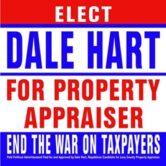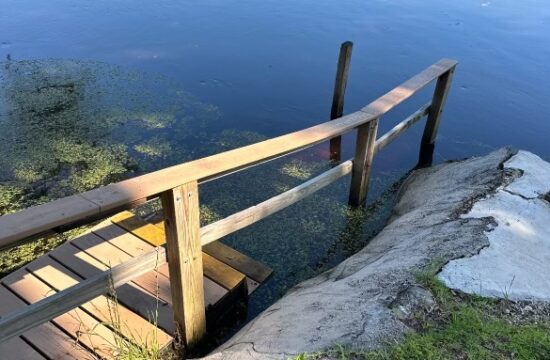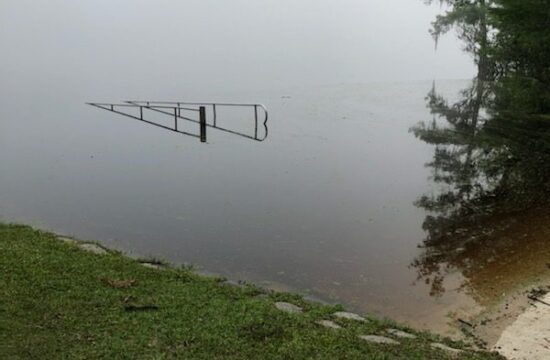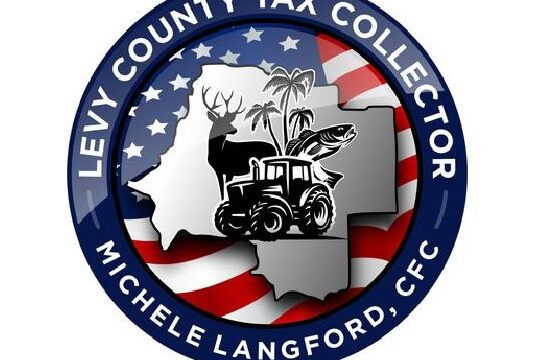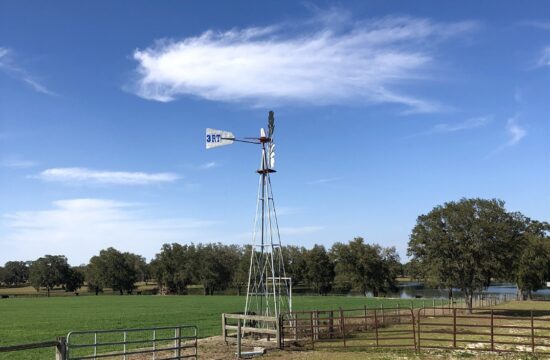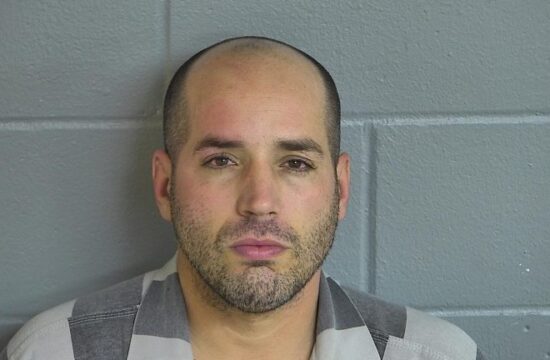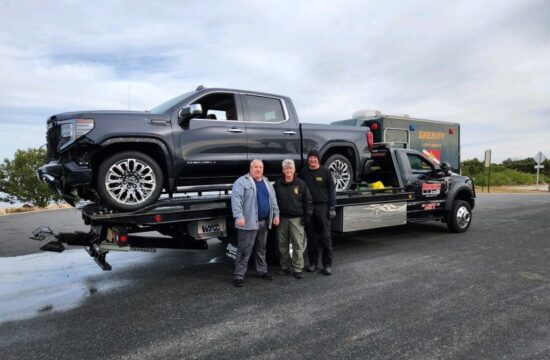By Terry Witt – Spotlight Senior Reporter
Hostility and resentment grew like a wildfire at a July 10 public hearing in Bronson when residents were lectured by a Levy County planning commissioner on why 75 sand trucks a day should have the right to use county roads for hauling sand from a proposed 1,110-acre mine.
“I want to address something with the roads. You’re right, those are county roads. It is the county’s responsibility to keep up those roads. It is the county’s responsibility to have money to keep up those roads,” said Commissioner J.D. Holmes III. “We don’t need to be communist China dictating every single thing that’s on every road.”
The Levy County Planning Commission voted 4-1 later in the meeting to recommend construction of the mine south of Bronson, with Chairman Parks Wilson, and Commissioners Tommy Harper, Kelly Bishop, and Holmes favoring operation of the mine and Commissioner Thad Barber, a retired Levy County miner, opposed to the mine being established at the proposed site in a sprawling residential neighborhood of more than 2,800 home sites within two miles.
The planning board’s recommendation for approval is scheduled to be discussed in a final public hearing at the Levy County Commission’s July 25 regular meeting, County Coordinator Wilbur Dean said Friday afternoon, but rumors have also circulated that the hearing has been postponed. Spotlight has been unable to get an answer on whether the rumor is true.
“It’s Sunday. I’ll deal with this tomorrow,” said County Commissioner John Meeks in a Sunday text. The sand mine would be in Meeks district if approved by the county commission.
Members of the crowd at the July 10th hearing were already angry about the possibility of a major sand mine being constructed in their quiet residential neighborhood when Holmes began challenging their comments that County Roads 102 and 103 and 337 would be damaged by dump trucks and 18-wheelers using the roads to haul sand.
Ultimately, planning commissioners recommended using only CR 337 for the mine’s entry and exit points. CR 337 is the only major arterial county road in the area available for trucks using the mine, but the use of CR 337 also presents potential problems because the two-lane highway empties into U.S. 27A in the heart of Bronson. If hundreds of dump trucks, and 18-wheel sand trucks, use the intersection daily it could generate safety issues and congestion for local traffic on the federal highway.
Holmes’ comments were preceded by statements from Kathleen Mullins, a resident who identified herself as someone who works for a sand mine and knows something about how they operate. The applicant for the sand mine, Ryan Thomas, is requesting a special exception to operate the mine in a residential area. He is estimating 75 truck trips per day from the mine. Mullins said the number is low. The actual number of daily round trips from the mine would be 150. When 75 trucks arrive empty and then leave the mine loaded it represents one round trip.
“The number of trips at 75 is far underestimated. We sometimes can do 350 trucks a day. I travel 102 and 103 every day. Those roads are not meant for that type of commercial traffic. The roads could be chewed up completely unless the county has the money to replace those roads. Those are county roads.”
Planning commissioners recommended removing CR 102 and 103 from use by sand trucks, but kept CR 377 in play, much to the dismay of residents who live along the hilly two-lane road and would have to put up with heavy truck traffic every day if the mine is allowed to be developed at that site.
Mullins also questioned the applicant’s plan to use “unsuitable” materials to fill in the holes left by mining operations. She said unsuitable materials could include clay, tree debris, concrete, asphalt, road undercut and construction debris, and agriculture waste. Commissioners told the applicant he couldn’t use offsite materials to refill the hole left by the mining as a condition of the special exception. But Mullins said that once the special exception is granted, the county has no control over what the owners of the mine are dumping at the site.
“You know it, I know it, and you have no way to inspect it,” she said.
Mullins was one of about 70 members of the audience to speak in opposition to the mine during the public comment portion of the meeting.
Holmes decided to speak immediately after Mullins finished her comments, angering a crowd that didn’t want a planning commissioner cutting into their public comment time. They felt it was the public’s time to speak. Holmes wanted to inject his comments into the discussion about roads. Wilson allowed him to speak.
“Now, I don’t mean for a dump truck to run up in the middle of the schools, but we’ve got agriculture, we’ve got timber, we got watermelon trucks, we got a lot of heavy equipment on these roads,” Holmes said. “Are we going to start hand-picking what comes up and goes down this road and you can’t go down this one; this man’s making a living with timber and going down this road but he can’t go down this one; this man is driving a one-ton truck and can go down this one but not this one.”
One man yelled from the audience, “This is the public’s time, sir.”
Holmes responded: Yes sir, and I’m part of the public.”
Public comment time is reserved for people in the audience that wish to address the issue.
The crowd shouted angry remarks at Holmes.
“Sir, you don’t have to stay in here, did you know that?” Holmes shouted back.
Wilson asked for order: “We’re getting a little outrageous,” he said.
A woman in the audience shouted, “We’re taxpayers.”
Holmes responded, “Yes ma’am, and I think…”
The crowd rumbled loudly in anger.
Wilson hit his gavel.
Holmes responded: “I understand your opportunity to speak, and you’ll get yours,” he said to people in the crowd.
“I just want us to think about these roads that are county roads. That means the people of Chiefland are going to put their tax dollars in a road that tears up in Williston – the people in Bronson are going to put their money in a road that tears up in Rosewood,” Holmes said. “I’m not telling you we should just open these up like an interstate. I’m telling you as a collective community you need to be mindful about that the gas tax is used for public roads. That’s what I’m going to tell you.”
“It’s still public access,” a man from the audience shouted.
When planning commissioners began to discuss the special exception, it became apparent to members of the audience that a recommendation for approval was coming from the planning commission regardless of what they had to say. They began filing out of the room in a silent protest. Commissioners silently took notice that many in the crowd were walking out as they were talking.
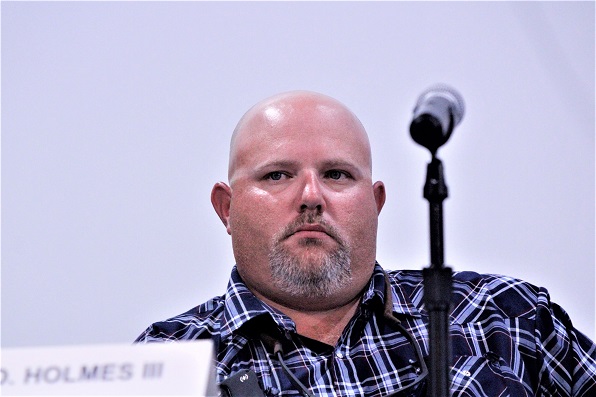
————————-
Planning Commission Regular Meeting July 10, 2023; Posted July 16, 2023





